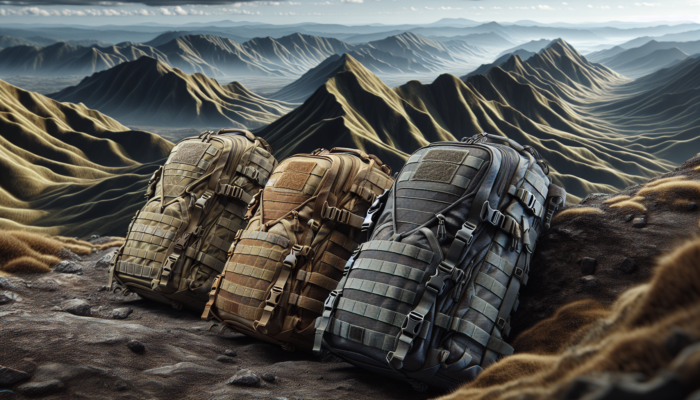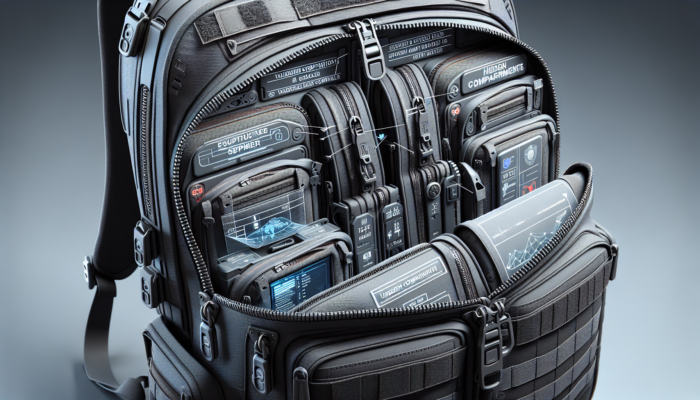Enhancing the Durability of Tactical Backpacks Through Superior Material Selection
Exploring High-Performance Fabric Options for Tactical Backpacks

When assessing the features of tactical backpacks, the selection of fabric plays a critical role in ensuring both longevity and optimal performance. The most widely used materials in the construction of tactical backpacks include nylon, polyester, and Cordura. Each of these fabrics comes with unique properties, specifically engineered to confront various environmental challenges, meeting the diverse needs of both outdoor enthusiasts and professionals who rely on their gear for dependable performance in demanding conditions. Hence, choosing the appropriate material is vital for ensuring reliability in the field.
Nylon is celebrated for its remarkable strength-to-weight ratio, rendering it the preferred choice for adventurers and military personnel alike. Its exceptional resistance to abrasion guarantees that the backpack can endure rough handling and harsh conditions, while its lightweight nature adds minimal bulk during use. In contrast, polyester serves as a more cost-effective alternative, offering decent waterproofing features; however, it may fall short in durability compared to nylon. Cordura fabric is the premium selection for users who demand unparalleled durability, as it is meticulously crafted to resist tears and scuffs, making it ideal for the most challenging outdoor adventures.
The selection of material is pivotal in determining both the weight and functionality of the backpack. Among these choices, nylon frequently emerges as the preferred option for individuals who value strength and resilience in their tactical gear, thereby showcasing its superiority in various operational scenarios.
Reinforcing Stress Points for Exceptional Durability and Longevity
In the rigorous realm of tactical operations, a backpack's capability to manage heavy loads and endure severe conditions is indispensable. This is where the reinforcement of stress points becomes an essential consideration. Critical areas such as straps, handles, and seams are often bolstered with additional layers of fabric or enhanced stitching, which significantly improves their durability and reliability.
By fortifying these stress points, manufacturers ensure that the backpack can support the weight of heavy equipment like tools and tactical gear without jeopardising its structural integrity. For instance, a backpack fitted with reinforced straps greatly reduces the chances of tearing or breaking, instilling confidence in users as they traverse rugged terrains. This feature is especially vital when the backpack contains high-value items or essential survival gear, where reliability is paramount.
Moreover, the reinforcement of stress points can markedly prolong the overall lifespan of the backpack. By minimising wear and tear in areas subjected to heavy stress, manufacturers provide users with the assurance that their gear will remain dependable for years, transforming it into a wise investment. For those committed to their tactical needs, durability is not merely an option; it is an absolute necessity.
Ensuring Weather Resistance for Unpredictable Outdoor Conditions
Unforeseen weather conditions can present considerable challenges; thus, possessing a backpack specifically designed to protect against rain and moisture is crucial for survival in the field. Many tactical backpacks are equipped with weather-resistant coatings or linings that effectively shield the contents from environmental factors, ensuring that your gear remains intact and operational.
The spectrum of these coatings ranges from basic water-repellent treatments to advanced waterproof membranes that proficiently keep moisture at bay. Additionally, certain backpacks incorporate sealed seams that prevent water ingress through stitching and zippers. This extra layer of protection is essential for safeguarding electronics, clothing, and other vital gear, particularly during adverse weather events.
Furthermore, a backpack’s ability to withstand diverse weather conditions enhances its practicality across a variety of missions. Whether you are hiking through damp environments or facing sudden downpours, selecting a tactical backpack with robust weather resistance can significantly improve your preparedness and overall experience in the field.
Enhancing Compartment Organisation for Increased Tactical Efficiency

Main Compartment: The Central Hub of Your Tactical Backpack
A well-organised backpack can dramatically enhance your effectiveness, particularly in critical situations where every second counts. The main compartment of a tactical backpack is meticulously designed to accommodate larger items such as laptops, clothing, or survival gear, while also featuring internal pockets for streamlined organisation and quick access.
These internal pockets empower users to segregate their belongings, facilitating the swift location of specific items. For example, a dedicated laptop sleeve provides additional cushioning and protection, enabling you to transport your technology securely without the risk of damage. The spacious main compartment typically includes a wide opening for effortless access to its contents, which can be invaluable during time-sensitive missions where efficiency is paramount.
Additionally, many tactical backpacks integrate modular systems within the main compartment, allowing users to tailor their organisational strategies to fit their specific needs. This adaptability can be particularly advantageous for professionals who require seamless transitions between various activities, ranging from outdoor expeditions to urban outings.
External Pockets: Swift Access to Essential Gear
External pockets are a defining feature of tactical backpacks, designed specifically for rapid access to vital items. Whether it’s maps, snacks, or tools, these pockets are invaluable during fast-paced activities where efficiency is crucial.
Numerous tactical backpacks incorporate MOLLE (Modular Lightweight Load-carrying Equipment) webbing on their external surfaces, allowing users to attach various pouches and accessories that enhance functionality. This feature not only increases the versatility of the backpack but also aids in the efficient organisation of smaller items, ensuring that essential gear is always easily accessible.
Furthermore, these external pockets frequently come with secure closures, such as zippers or Velcro, to ensure that your belongings remain protected while navigating rugged environments. The thoughtful design of external pockets encapsulates the essence of tactical backpacks—a harmonious combination of functionality and accessibility.
Hidden Compartments: Combining Security with Practicality

Given the unpredictability of modern life, prioritising security is essential, and hidden compartments within tactical backpacks offer an excellent solution for safeguarding valuables. These compartments are typically concealed within the main compartment or cleverly integrated under flaps, making them difficult for potential thieves to locate and access.
The design of these hidden compartments varies widely, with some featuring lockable zippers for added security. This allows users to securely store important documents, electronics, or personal items discreetly, providing peace of mind during travel or outdoor activities.
Additionally, hidden compartments can serve practical functions beyond mere security. For instance, they can house emergency gear or first-aid kits that require immediate access without necessitating a rummage through the main compartment. This thoughtful design element enhances the overall functionality of the tactical backpack, appealing to users who value both security and efficient organisation.
Focusing on Comfort and Ergonomics for an Enhanced User Experience
Padded Shoulder Straps for Exceptional Comfort
Comfort should always be a primary consideration when selecting a tactical backpack. Padded shoulder straps are an essential attribute that significantly enhances comfort during extended use. These straps are specifically designed to distribute weight evenly across the shoulders, alleviating pressure points that could lead to discomfort or fatigue during long excursions.
Many tactical backpacks come equipped with adjustable shoulder straps, enabling users to personalise the fit based on their body size and shape. This customisation can dramatically improve the user experience, particularly during protracted hikes or missions. Additionally, breathable padding functions to wick away moisture, ensuring users stay cool and comfortable throughout their activities.
Investing in a backpack with high-quality padded shoulder straps guarantees that you can carry your gear in comfort, allowing you to focus on your tasks without being distracted by discomfort. Such attention to ergonomic design reflects a commitment to quality that is vital for any serious adventurer or professional.
Waist and Chest Straps for Optimal Load Distribution
Numerous tactical backpacks feature waist and chest straps to optimise comfort and ensure effective weight distribution. These features stabilise the pack during movement, assisting in reducing strain on the back and shoulders, which is particularly beneficial during long treks.
Waist straps wrap around the hips, effectively shifting a portion of the load from the shoulders to the stronger muscle groups of the lower body. This alteration in weight distribution is especially advantageous when the backpack is heavily loaded. Simultaneously, chest straps help secure the pack, preventing it from shifting during active use.
Adjusting these straps allows for a tailored fit that accommodates various body types and load sizes, further enhancing overall comfort. With properly fitted waist and chest straps, users can maintain agility and mobility—essential traits for success in tactical scenarios.
Ventilation Systems: Keeping Cool Under Pressure
Maintaining a comfortable temperature under duress is essential, especially when traversing challenging terrains or engaging in physically demanding tasks. Tactical backpacks equipped with ventilation systems can significantly enhance user comfort by promoting airflow.
Advanced back panels featuring mesh or channels facilitate airflow, allowing heat and moisture to escape while keeping the back dry. This design helps to prevent overheating, ensuring that users can concentrate on their mission instead of battling discomfort caused by perspiration.
Moreover, a well-ventilated backpack can boost overall performance, as comfortable users are more likely to sustain their energy levels and stamina. The thoughtful integration of ventilation systems in tactical backpacks demonstrates a commitment to user comfort, ensuring they are fully prepared to tackle any challenges that arise.
Adjustable Back Length for a Customised Fit
Recognising that every individual is unique, a one-size-fits-all approach does not apply to tactical backpacks. An adjustable back length is a crucial feature that enables users to customise the fit of the pack to their torso size, significantly enhancing overall comfort and usability.
A proper fit is vital for effective weight distribution, and adjustable back lengths allow users to achieve that ideal balance. This feature accommodates a wide range of body types, ensuring that your backpack fits comfortably whether you’re tall, short, or anywhere in between.
Furthermore, an adjustable back length can improve accessibility to various compartments, granting users easier access to their gear when necessary. This flexibility is invaluable and enhances both comfort and efficiency, making it an essential characteristic of any high-quality tactical backpack.
Lumbar Support Padding for Enhanced Comfort
Fatigue can significantly impede performance during long missions or outdoor adventures, making lumbar support padding a vital feature in tactical backpacks. This added cushioning at the lower back alleviates pressure and provides extra comfort during extended wear.
By promoting a more natural posture, lumbar support helps to reduce the risk of back strain and discomfort, enabling users to maintain their energy levels throughout their activities. This feature is particularly beneficial for those who frequently carry heavy loads, as it mitigates the impact of weight bearing down on the lower back.
Furthermore, lumbar support padding enhances overall stability, ensuring that the backpack remains securely in place during movement. This added security greatly contributes to the user's experience, underscoring the importance of comfort in tactical gear.
Maximising Load-Bearing Capacity for Tactical Efficiency
Achieving Effective Weight Distribution for Enhanced Mobility
Effective weight distribution is crucial for anyone carrying a tactical backpack. By balancing the load across the body, users can reduce fatigue and significantly enhance mobility. Tactical backpacks are often designed with this principle in mind, incorporating various features to support optimal weight distribution.
Maintaining a natural posture is essential, ensuring that the weight is evenly spread across the shoulders, waist, and hips, which is particularly important during prolonged use. Inadequate weight distribution can lead to discomfort and increased strain, ultimately hindering performance in the field.
Moreover, certain tactical backpacks come equipped with internal frames or structural components to further facilitate this balance. This focus on weight distribution underscores the significance of thoughtful design in enhancing user experience and effectiveness during demanding tasks.
Selecting the Right Frame Type for Maximum Load-Bearing Capacity
The choice of frame type in tactical backpacks significantly influences their load-bearing capacity. There are primarily two types: internal and external frames, each offering distinct advantages and applications.
Internal frames provide a sleek design and greater flexibility, making them ideal for navigating tight spaces or rugged terrains. This type of frame typically stabilises the load while delivering a more streamlined appearance, essential for tactical missions where agility is paramount.
Conversely, external frames excel in providing support for heavier loads, effectively distributing weight across the back and hips. This makes them preferable for long-distance trekking or carrying substantial gear. The open design of external frames can also facilitate additional storage options, allowing users to attach extra pouches or gear as needed.
Ultimately, the selection between internal and external frames depends on the user's specific requirements. Understanding your mission needs can lead to more informed decisions, ensuring that your tactical backpack meets your demands throughout various adventures.
Customisable Adjustable Straps for Optimal Fit
Customisability is key in tactical backpacks, and adjustable straps empower users to achieve their ideal fit. These straps can be modified to accommodate different body types and load sizes, enhancing comfort and stability during use.
Adjusting the shoulder, waist, and chest straps allows users to tailor the backpack to their unique specifications. This flexibility ensures that weight is distributed optimally, reducing strain on the back and shoulders, particularly during extended wear.
Additionally, adjustable straps can accommodate various gear loads, ensuring a secure and comfortable fit whether you’re carrying light equipment or a fully loaded pack. This feature amplifies the tactical backpack’s functionality, making it a critical asset for any serious user.
Exploring Versatility and Adaptability in Tactical Backpacks
MOLLE System: Customisation at Your Fingertips
The Modular Lightweight Load-carrying Equipment (MOLLE) system has transformed the design and utility of tactical backpacks. This versatile attachment system allows users to customise their backpacks by adding various pouches and accessories tailored to specific needs and preferences.
The ability to affix additional gear or storage pouches externally significantly enhances the functionality of the backpack. Users can adapt their load to suit different missions, whether it's adding a hydration pouch for extended hikes or incorporating extra compartments for quick access to essential tools.
Furthermore, the MOLLE system promotes organisation, enabling users to arrange their gear in alignment with their workflow and personal preferences. This adaptability makes tactical backpacks equipped with MOLLE not only versatile but also indispensable for those who require flexibility in their gear setups.
Convertible Designs for Ultimate Versatility
In a dynamic environment, convertible design features in tactical backpacks offer unparalleled flexibility. Some backpacks are ingeniously crafted to transform into smaller bags or attach to other gear, providing incredible versatility for various missions.
For instance, a tactical backpack may include detachable components that can serve as smaller daypacks or bags for specific activities. This allows users to downsize their load when necessary while ensuring they have the right equipment for various scenarios, enhancing efficiency and practicality.
Moreover, convertible designs cater to both urban and outdoor settings, enabling users to transition seamlessly between different environments. This versatility enhances the practicality of tactical backpacks, making them a valuable investment for those engaging in a range of activities.
Modular Components: Tailoring Your Tactical Backpack to Your Needs
Modular components represent another innovative aspect of tactical backpack features, allowing users to mix and match interchangeable parts based on their unique requirements. This can include hydration bladders, laptop sleeves, or additional compartments that can be added or removed as needed.
The adaptability of modular components ensures that your tactical backpack can evolve alongside your changing requirements. For example, you might attach a hydration bladder for a day hike and remove it for a travel adventure that necessitates more organisation for electronics and important documents.
Modular components enhance user experience and satisfaction by allowing individuals to customise their backpacks. This level of functionality guarantees that each tactical backpack can effectively serve multiple purposes, making it an indispensable tool for adventurers and professionals alike.
Prioritising Security Features for Ultimate Peace of Mind
Lockable Zippers for Enhanced Security
In an era where theft remains a persistent concern, security features such as lockable zippers in tactical backpacks are invaluable. These zippers enable users to secure their backpacks with a padlock, thereby protecting their belongings.
When navigating crowded environments or engaging in high-risk activities, locking your backpack can deter potential thieves and safeguard essential items such as passports, electronics, or sensitive documents. This feature is particularly beneficial for individuals who frequently travel or operate in unpredictable environments.
Moreover, lockable zippers offer users peace of mind, allowing them to focus on their activities without the constant worry about the safety of their gear. This thoughtful inclusion underscores the importance of security in tactical backpack design, ensuring that users can confidently carry their essentials.
RFID Blocking Pockets for Protecting Sensitive Information
As technology advances, so do the methods of electronic theft. Tactical backpacks equipped with RFID (Radio Frequency Identification) blocking pockets provide a critical layer of security for sensitive information, such as credit cards and passports.
These specially designed pockets prevent unauthorised scanning of RFID-enabled cards, safeguarding personal information during travel. Given the rising incidence of electronic pickpocketing, this feature is crucial for anyone who prioritises privacy and security in today’s digital age.
Furthermore, RFID blocking pockets provide users with peace of mind, allowing them to carry their essentials without fear of identity theft. This feature underscores the importance of security in tactical backpack design, making it a vital attribute in contemporary gear.
Slash-Proof Materials for Enhanced Security
The risk of theft in urban environments necessitates robust security features in tactical backpacks. One notable attribute is slash-proof materials, specifically engineered to deter thieves from cutting into the backpack to access its contents.
These reinforced fabrics are designed to resist cuts and abrasions, providing a formidable barrier against potential threats. This heightened level of security is especially advantageous in crowded locations where personal safety can be compromised.
Investing in a tactical backpack constructed from slash-proof materials not only bolsters security but also instils confidence in users regarding their gear. Knowing that their belongings are protected against theft allows users to focus on their activities in bustling cities or remote outdoor settings.
Strategically Positioned Hidden Compartments for Increased Security
The element of surprise can serve as a powerful deterrent against theft, and hidden compartments in tactical backpacks are designed to leverage this principle. These concealed pockets can be strategically located within the main compartment or beneath flaps, making it challenging for potential thieves to locate valuable items.
By securely storing essentials such as cash, important documents, or electronics in these hidden compartments, users can significantly enhance the security of their belongings. This feature embodies clever design, aligning perfectly with the needs of tactical users who often require both security and organisation in their gear.
Moreover, hiding valuables can provide peace of mind in a variety of situations, ranging from travel to crowded events. This thoughtful design detail underscores the tactical backpack's role in ensuring the safety and security of its user's possessions.
Facilitating Accessibility and Ease of Use
Quick-Release Buckles for Rapid Access
In scenarios where time is of the essence, quick-release buckles in tactical backpacks can be transformative. These buckles provide rapid access to the main compartment, which is especially crucial in emergencies or when every second counts.
The convenience of quick-release buckles ensures users can open their backpacks swiftly, granting immediate access to essential gear. This feature is particularly important for those who require fast responses in high-stress situations, such as first responders or military personnel.
Moreover, the ease of use afforded by quick-release buckles enhances the overall user experience. A well-designed tactical backpack should facilitate seamless transitions between tasks, allowing users to focus on their objectives without being hindered by cumbersome closures.
Ambidextrous Designs for Versatile Accessibility
An often-overlooked aspect of tactical backpacks is their ambidextrous design. This feature ensures that users can access their gear comfortably and efficiently, regardless of their dominant hand, catering to a broader audience.
This versatility is particularly beneficial when users need to operate their equipment quickly while managing their backpack. An ambidextrous design allows for greater flexibility and ease of use, which is essential in tactical scenarios where adaptability is key to success.
Moreover, this thoughtful design approach accommodates a wider range of users, making the backpack suitable for everyone, regardless of handedness. By prioritising versatility in design, manufacturers can significantly enhance the user experience while ensuring that tactical backpacks meet the diverse needs of their audience.
Ergonomic Design for Maximum Comfort
An ergonomic design is paramount for ensuring comfort during prolonged use of tactical backpacks. Features such as contoured handles and straps play a vital role in improving the overall user experience, helping to reduce strain and fatigue during extended wear.
Backpacks designed with ergonomic principles can substantially enhance how weight is distributed across the body. This reduction in strain allows users to carry their gear for extended periods without discomfort, which is especially important during long missions or outdoor adventures.
Furthermore, an ergonomic design can enhance efficiency, allowing users to move more fluidly without the burden of an awkwardly fitting backpack. Prioritising ergonomic principles in tactical backpack design reflects a commitment to user comfort, ultimately boosting performance across various scenarios.
Frequently Asked Questions About Tactical Backpacks
What are the essential features of a tactical backpack?
The essential features of a tactical backpack encompass durability, compartment organisation, comfort, load-bearing capacity, versatility, security features, and ease of use, all specifically tailored for outdoor and military applications.
Are tactical backpacks waterproof?
Many tactical backpacks come equipped with water-resistant coatings or waterproof linings to protect contents from rain and moisture. However, it is essential to check specific product details for waterproof ratings.
What is the MOLLE system?
The MOLLE system (Modular Lightweight Load-carrying Equipment) is an attachment system used in tactical gear. It allows users to customise their backpacks with additional pouches and accessories for enhanced utility and convenience.
How do I choose the right size tactical backpack?
Selecting the appropriate tactical backpack size depends on your intended use, the gear you plan to carry, and your body type. Consider the volume and weight capacity to ensure comfort and functionality.
Are tactical backpacks suitable for everyday use?
Yes, tactical backpacks are indeed suitable for everyday use. Their durability, organisational features, and comfort make them ideal for daily commutes, gym sessions, and outdoor excursions.
What materials are ideal for tactical backpacks?
Nylon, polyester, and Cordura are the recommended materials for tactical backpacks, each offering varying levels of durability, water resistance, and weight considerations for different applications.
Can tactical backpacks accommodate hydration systems?
Many tactical backpacks are designed to accommodate hydration systems, featuring dedicated compartments or sleeves for hydration bladders, ensuring quick access to water during physical activities.
How should I maintain my tactical backpack?
To maintain your tactical backpack, regularly clean it according to the manufacturer's instructions, check for wear and tear, and store it in a cool, dry place to prolong its lifespan and performance.
What differentiates tactical backpacks from regular backpacks?
Tactical backpacks are designed with features specifically tailored for durability, organisation, and security, making them suitable for outdoor, military, and emergency situations, unlike regular backpacks, which may lack these essential attributes.
Are tactical backpacks worth the investment?
Absolutely, tactical backpacks are worth the investment due to their high-quality materials, versatile features, and exceptional durability. These attributes ensure that they can withstand rigorous use and serve multiple purposes effectively.
Explore our world on X!
The post Tactical Backpack Features: Essential Guide appeared first on Survival Bite.
The Article Tactical Backpack Features: Your Essential Guide to Selection Was Found On https://limitsofstrategy.com

